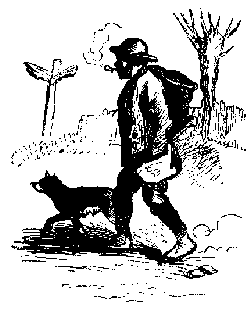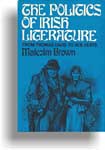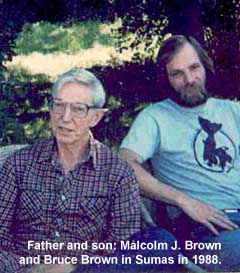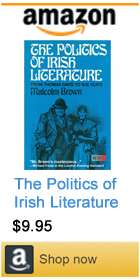Chapter Six
Black '47
DAVIS DIED on September 16, 1845. Three days earlier the British horticultural press had taken its first notice of the alarming appearance in Ireland of the "potato murrain" or potato rot. In a few weeks the blight had spread all over Ireland, destroying about half of the 1845 potato harvest. Potatoes were the only source of carbohydrates for the Irish small peasants and cottiers, and without them they would starve. Thus began the Irish famine, one of the major peacetime disasters of modern history. It found the native leadership weakened by the split between Old and Young Ireland; and worse troubles lay ahead.
Davis' sudden death was a staggering blow to the Young Irelanders. Their deference to his judgment was absolute and their affection for him pure adulation. Among them he had no rivals, only disciples. For a moment they were not sure they could carry on without him. But events in the three years after his death were to move at an even dizzier pace than in the three years preceding, and the survivors were not allowed much time for weeping. Young men unknown to Davis knocked to ask admission, and the living cast about to replace the dead. Three of Davis' lieutenants -- Gavan Duffy, John Mitchel, and Smith O'Brien -- were the presumptive heirs to his leadership, each representing a single facet of his own many-sided personality. With fine poise and sweetness of temper, Davis had made harmony among them. But his survivors could not. On top of all its other woes, Young Ireland had now to contend with its own internal disintegration.
Gavan Duffy took over the Nation. He represented the practical side of Davis' character, the voice that said, "Arigna must be pierced with shafts." He was clear-headed, efficient, and prudent; he kept his shop so that his shop might keep him. He made a financial success of every activity he undertook, including radicalism, as O'Connell sarcastically reminded him. These qualities permeated his prose style, which was forcible, lucid, and fair-minded. But he was more timid than Davis and more awed by respectability. His printer's style sheet required a deferential capital for "the People," but as has been noted, he was one of the sources for the dilution of Davis' original agrarian radicalism. One of his poems, "The Muster of the North," contains the lines:
- The Green alone shall stream above our native field and flood
The spotless Green, save where its folds are gemmed with Saxon blood!
To this poem he appended a footnote for disclaimer: "The ballad here printed is not meant as an apology for these excesses." He often used the word "excess," and he shared all of O'Connell's fears of "democratic excess." Duffy's prudential reflexes were made clear in a leading article he wrote immediately after Davis' funeral. Starting off from the familiar jacquerie threat, long used by Davis to penetrate the after-the-hunt drowsiness of the Protestant gentry, he diverged into a bold new idea of his own concerning the Young Irelanders' proper historical function: in the coming revolution they would be the referee. He had long been convinced that "Ireland will not be redeemed by the Aristocracy-it cannot be redeemed by the Peasantry,"' leaving the name of the redeemer an easy riddle to answer. Recently he had been studying Lamartine's L'Histoire des Girondins, a proper guide to sobriety "a la veille d'une revolution."According to the French analogy, either a peasant revolution or an aristocratic counterrevolution would shortly be attempted in Ireland. "Out of such a crisis," said Duffy, "sprung the great French Revolution." But there was a third way, by which both "excesses" could be avoided. Righteous and temperate young men might intercede as mediators. "Such fiery young men, disciplined in the strictest probity, as those who chastised the courtly tyranny with the one hand, and beat back the murderous mob tyranny of the Marats and Robespierres with the other, would stand between the lords and the tillers of the land, and arbitrate justice without violence." Young Ireland, in short, should constitute itself the Irish Gironde, with Duffy for its Brissot.
In exact contrast to Duffy was John Mitchel, volcanic and irreconcilable, representing the angry Davis who had put the Manual of Artillery on his bookshelf beside his Thierry and Beranger. His father was an Ulster Presbyterian minister who had defected to Unitarianism, so that he had Calvinist nurture but no home in any of the three great Irish sectarian families. He was a newcomer to the Nation. While the early Young Irelanders were theorizing about Irish agrarian grievance, he was gaining a concrete intimacy with it in the legal defense of peasants charged with stealing the landlords' seaweeds and limestone. Of all the Young Irelanders, he had the best knowledge of the condition of Ireland when he came to join the Nation just before Davis' death. He had read Carlyle fervently, absorbing both his thought and his style. He considered The French Revolution "the profoundest book that English literature ever produced"; and after the two men became friends, Carlyle's talk seemed to him "like the speech of Paul or Chrysostom." When he first began to write for Young Ireland, Davis had to order him to delete his distressing Carlylean mannerisms. Following this necessary stylistic surgery, he became the most incisive and fearless writer among the Young Irelanders...
|
|
Table of Contents
|

|
Astonisher.com is pleased to offer these excerpts from The Politics of Irish Literature by Malcolm Brown...
Praise for
The Politics of Irish Literature |
 |
|
"This brilliant study of the intersection of politics and literature in Ireland amounts to a dazzling portrait gallery. Reading it one feels about one the breath, warmth, and passions of the dead all come alive again."
-- Sean O'Faolain in the Manchester Guardian
"Mr. Brown's masterpiece has made me want to hire a nearby housetop and recite whole chunks to every passerby..."
-- Michael Foote in the London Evening Standard
"The author of the best book on George Moore now gives us what is in all likelihood the best book on the politics of modern Irish literature."
-- Virginia Quarterly Review
|
|

University of Washington Professor Malcolm J. Brown (1910 - 1992) with his son, Bruce Brown, in Sumas, WA, July 1988.
|
Additional reading -- Malcolm Brown's George Moore: A Reconsideration. Also see Bruce Brown's commentary on The History of the Corporation for Malcolm Brown's contribution to that work.
|
|
|






